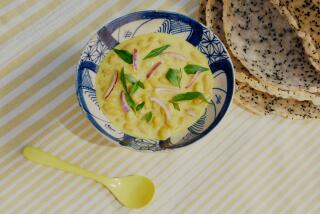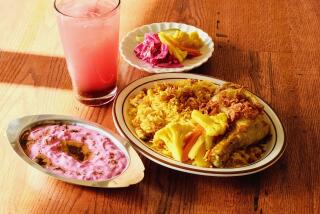Mumbai’s strictly vegetarian enclave gives flesh-eaters the evil eye
In a roughly 2-square-mile patch containing some of India’s priciest real estate, a firm and sometimes militant vegetarianism prevails. Most residents of this old-money section of South Mumbai are Jains or devout Hindus, and not only do they not eat flesh, but they also don’t want it anywhere near them.
Eateries serving meat and seafood are all but banned, and stories abound of certain apartment buildings refusing to consider prospective residents who are what Indians call — sometimes with more than a soupcon of judgment — non-vegetarians.
“They’re pretty fascist about it,” says food writer Roshni Bajaj Sanghvi. “I’ve seen Bengali friends and others complain that they’ve tried to move somewhere and the building says, ‘Oh, you are fish-eaters, you’ll smell up the place, so we won’t give you the apartment.’”
A menu by prominent restaurateur Sanjay Narang that included tandoori chicken and lamb curry ticked off neighbors in an apartment building on an exclusive boulevard fronting the Arabian Sea. Narang shuttered his ground-floor establishment in 2005 after residents above reportedly spat on his patrons, dropped nails on them or keyed their cars.
So what’s a global food and beverage behemoth to do in such circumstances?
If you’re Starbucks — which seems intent on cracking every lucrative Indian market — you go with the flow.
The coffee chain’s new outpost off palm-fringed Marine Drive doesn’t sell the local-style club sandwiches or murg kathi wraps — flatbreads stuffed with spiced chicken — found at dozens of other Starbucks in India. The brightly lighted display case contains only meatless fare: a hummus and pita platter, a spicy red bean sandwich, a mushroom and sun-dried tomato filling on ciabatta.
There are no potatoes, onions or omelets in sight, either, in deference to Jains, who eschew not only meat but also eggs and root vegetables plucked from beneath the earth. Muffins, cakes and pastries made with egg are clearly labeled, in keeping with Indian law.
“It’s a Jain area,” explained Sanjay, a young barista. “Their preference.”
Starbucks’ Indian office did not respond to questions. But the menu is clearly in line with snack shops and ice cream stalls in the neighborhood that bill themselves as “100% pure veg,” including doughnuts that come in eggless varieties.
“If you open a non-veg restaurant there,” said Sanghvi, “even if they don’t force you to shut down, you will shut down eventually because the richest people in the neighborhood are vegetarian and your business doesn’t survive.”
India may be overwhelmingly Hindu, a religion that regards the cow as sacred, but national surveys suggest that less than half the population is vegetarian.
Mumbai, as India’s long-standing commercial capital, is home not only to native Marathis but also sizable minorities of Muslims, Zoroastrian Parsis, Christians from western India and Bengalis from the east — all generally non-vegetarians. Some of the city’s best-loved dishes include meat and seafood: Persian-inspired lamb cutlets, aromatic chicken biryani and the pungent dried fish known as Bombay duck.
But perhaps because of metropolitan Mumbai’s sheer density — 21 million people packed into a narrow strip along the Arabian Sea — residents have carved out enclaves where they can live among those who eat and worship as they do.
The penchant seems to run strongest in South Mumbai near Marine Drive, a sea-hugging thoroughfare that in British colonial days was dubbed the Queen’s Necklace because its streetlights resembled a string of pearls. Patrons line up outside “Veg and Proud” restaurants that promise “Jain Food Available.”
Many of the gently decaying old apartment blocks are occupied almost exclusively by Jains or well-connected merchant families from the neighboring state of Gujarat, who are strict vegetarians. (Prime Minister Narendra Modi, a Gujarati, served visiting heads of state an all-vegetarian menu at his inauguration in May.)
The influx of these groups has not sat well with some native Marathis.
“Marathis don’t get accommodation of their choice because they are Marathis and non-vegetarian,” local lawmaker Nitesh Rane said recently. He was attempting to explain a tweet in which he urged Mumbai residents to start “cleaning up all the Marathi hating gujjus from there once for all.”
The Starbucks sits near a series of Gujarati-owned diamond boutiques and sweet shops and next to the Shree Krishna Hindu Merchants Club, a members-only establishment named for a Hindu god. The club naturally forbids meat (although it was long known for hosting underground high-stakes card games).
To the west lies Malabar Hill, the city’s toniest district and site of a famous Jain temple, where many grocers don’t stock eggs and the handful of stalls that sell frozen meat and fish have faced occasional pressure to close.
Basant Todi, whose family runs Kurries and Burries, a fast-food place across from Starbucks, said: “Ninety percent of the people in this lane are Jains. If you have non-veg items, they will avoid you.”
His tiny, colorful eatery features a typically eclectic Mumbai menu, including nachos and tom yum soup. But whereas its first location, in a suburban office park, serves Thai curries and khao suey, a Burmese noodle dish, here it has excised those dishes because they require onion and garlic.
“You can’t make a Jain khao suey,” Todi explained.
There are rare exceptions to the meat-free zone. An outpost of Domino’s Pizza, which once took chicken toppings off its menu, is currently non-vegetarian. And then there’s the venerable Kobe Sizzlers, which has been serving chicken, lamb and seafood stir-fries out of a buzzing ground-floor location for 35 years.
Owner Urmila Sheth, a Gujarati grande dame wearing pearls and a giant diamond-studded nose ring, said hers was one of the first stir-fry restaurants to open in Mumbai. As the neighborhood has become more gastronomically conservative, her meat-heavy menu appears to have been grandfathered in.
Yet even Sheth has recently converted to vegetarianism after deciding she couldn’t stomach the idea of a chicken being slaughtered. Her son, who helps manage the business, eats “everything,” she sighed, but Sheth no longer dines at her own restaurant.
“I can’t stand anyone eating fish at my table,” she said.
More to Read
Start your day right
Sign up for Essential California for news, features and recommendations from the L.A. Times and beyond in your inbox six days a week.
You may occasionally receive promotional content from the Los Angeles Times.







